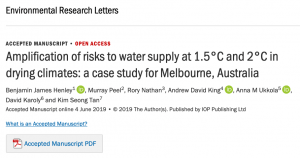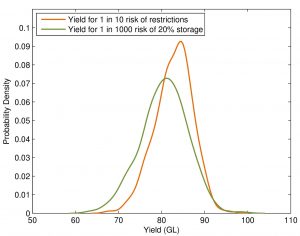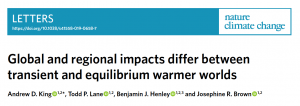News
Paper published in Nature Climate Change (23 December 2019): A paper by Andrew King, Todd Lane, Ben Henley and Jo Brown was published in Nature Climate Change and appeared in the January 2020 edition of Nature Climate Change. The paper demonstrates the difference between transient and equilibrium warming on temperature and population, and is available here, with the full version available on request.
AMOS-ICTMO 2019 (11-14 June 2019): Ben, Andrew, Mandy and David along with many colleagues attended AMOS-ICTMO in Darwin. Ben gave two oral presentations: one on the work behind the ERL paper on the risks to water supply at 1.5 and 2.0°C (case study for Melbourne) and the other on the global temperature reconstruction by the Pages2k consortium, led by Raphael Neukom, just accepted for publication in Nature Geoscience. Ben also chaired a session on drought and co-convened the sessions on drought and palaeoclimatology. Andrew presented his work comparing transient and equilibrium responses to climate change and Mandy presented her work looking at El Niño event types in CMIP5 models.
Paper accepted in Nature Geoscience (5 June 2019): A paper by 17 scientists in the Pages2k Consortium, led by Raphael Neukom, and including Ben, was accepted for publication in Nature Geoscience. The paper reconstructs global temperature over the past 2000 years (more soon!).
 Paper accepted in Environmental Research Letters (5 June 2019): Our paper, led by Ben, titled ‘Amplification of risks to water supply at 1.5°C and 2°C in drying climates: a case study for Melbourne, Australia’ was accepted for publication in Environmental Research Letters. The paper is Open Access and is available in full here. The citation is: Henley, B. J., Peel, M., Nathan, R., King, A. D., Ukkola, A. M., Karoly, D., & Tan, K. S. (2019). Amplification of risks to water supply at 1.5°C and 2°C in drying climates: a case study for Melbourne, Australia. Environmental Research Letters, doi:10.1088/1748-9326/ab26ef
Paper accepted in Environmental Research Letters (5 June 2019): Our paper, led by Ben, titled ‘Amplification of risks to water supply at 1.5°C and 2°C in drying climates: a case study for Melbourne, Australia’ was accepted for publication in Environmental Research Letters. The paper is Open Access and is available in full here. The citation is: Henley, B. J., Peel, M., Nathan, R., King, A. D., Ukkola, A. M., Karoly, D., & Tan, K. S. (2019). Amplification of risks to water supply at 1.5°C and 2°C in drying climates: a case study for Melbourne, Australia. Environmental Research Letters, doi:10.1088/1748-9326/ab26ef
Paper published in Nature Geoscience (6 May 2019): Our paper, led by Mandy, titled ‘Higher frequency of Central Pacific El Niño events in recent decades relative to past centuries’ was published in Nature Geoscience here. The paper uses coral records from the Pacific to reconstruct El Niño event types for the past four centuries. The citation is: Freund, M.B., B. J. Henley, D. J. Karoly, H. V. McGregor, N. J. Abram, D. Dommenget, (2019). Higher frequency of Central Pacific El Niño events in recent decades relative to past centuries, Nat. Geosci., doi: 10.1038/s41561-019-0353-3
 Article published on The Conversation (6 May 2019): An accompanying piece for the Nature Geoscience paper was published on The Conversation here. The piece is titled ‘El Niño has rapidly become stronger and stranger, according to coral records’.
Article published on The Conversation (6 May 2019): An accompanying piece for the Nature Geoscience paper was published on The Conversation here. The piece is titled ‘El Niño has rapidly become stronger and stranger, according to coral records’.
Workshop on the Science of Multi-year Drought (13–15 Feb 2019): This workshop held at Monash University was convened by Ailie Gallant and Scott Power, and co-convened by Ben and others. From the VicDRIP team, Ailie, Ben, Natasha, Mandy and Murray presented and/or attended the workshop.
 Engineers Australia Hydrology and Water Resources Symposium (3–6 Dec 2018): Ben, Natasha, Murray, Rory, and most of our PIs presented and/or attended the Hydro symposium in Melbourne.
Engineers Australia Hydrology and Water Resources Symposium (3–6 Dec 2018): Ben, Natasha, Murray, Rory, and most of our PIs presented and/or attended the Hydro symposium in Melbourne.
ARC Centre of Excellence for Climate Extremes (CLEX) annual workshop (19–21 Nov 2018): Ben, Natasha and Mandy attended the CLEX Annual Workshop. Ben presented in a session aimed at bringing together knowledge about the current drought. Natasha, Mandy and Ben presented posters at the workshop.
Article submitted on drought risk at 1.5 and 2 degrees of warming (12 Nov 2018): Ben, Murray, Rory, Andrew, Anna and David submitted an article on understanding drought risks at the Paris Agreement warming levels of 1.5 and 2 degrees.
Presented at the DELWP VicWaCI Science Day (10 Nov 2018): Ben presented at DELWP’s VicWaCI science day, along with other researchers from the VicWaCI initiative. Ben’s talk was titled “How can we use palaeoclimate data in water resource planning?”
Detection and Attribution workshop at UNSW (30 Oct – 1 Nov): Ben and Andrew attended a workshop at UNSW, hosted by Sarah Perkins-Kirkpatrick. The workshop focussed on the detection and attribution of heat-health impacts.
Presentation at the Australian Cotton Conference (7–9 Oct 2018): Ben gave an invited talk at the Australian Cotton Conference titled “Interdecadal climate variability and climate change Impacts on Australian rainfall”.
 Article published in The Conversation (8 June 2018): Andrew, Ben and Anna Ukkola (UNSW) published an article in The Conversation here titled ‘Is Australia’s current drought caused by climate change? It’s complicated’. The piece discusses the influence of climate change on drought.
Article published in The Conversation (8 June 2018): Andrew, Ben and Anna Ukkola (UNSW) published an article in The Conversation here titled ‘Is Australia’s current drought caused by climate change? It’s complicated’. The piece discusses the influence of climate change on drought.
Project Management Meeting #5 (7 May 2018): The CI, PI and research team met at Melbourne Water and discussed our latest work. We discussed Ben’s recent work looking at drought at 1.5 and 2 degrees and palaeoclimate reconstructions, as well as Natasha’s synthesis work. We had updates from partners and put into action our plan for some new work commencing at Monash with Ailie’s return.
 Article published in The Conversation (2 May 2018): Mandy and Ben, along with Kathy Allen (Unimelb) and Patrick Baker published an article in The Conversation here describing the long-term context of droughts in Australia, titled ‘Recent Australian droughts may be the worst in 800 years’. based on the paper led by Mandy in Climate of the Past here.
Article published in The Conversation (2 May 2018): Mandy and Ben, along with Kathy Allen (Unimelb) and Patrick Baker published an article in The Conversation here describing the long-term context of droughts in Australia, titled ‘Recent Australian droughts may be the worst in 800 years’. based on the paper led by Mandy in Climate of the Past here.
Project Teleconference (20 March 2018): The CI team met with industry partners to discuss the progress and next stages of the project.
AMOS-ICSHMO 2018 (5-9 Feb 2018): Ben, Mandy and David attended the Australian Meteorological and Oceanographic Society (AMOS) and American Meteorological Society (AMS) joint 25th AMOS National Conference and 12th International Conference for SouthernHemisphere Meteorology and Oceanography, AMOS-ICSHMO 2018, at UNSW in Sydney. Ben presented a talk on “Severe drought in southern Australia in a warming world” and convened a session with Anna Ukkola (UNSW) on “Processes, impacts and likelihood of severe droughts in the Southern Hemisphere”. Ben and Anna hosted invited speaker Dr Ben Cook from NASA GISS. Mandy presented a talk on “Has El Niño changed its flavour? Recent changes in a multi-century context”. Please contact Ben or Mandy for more information about the talks or sessions at the conference.
 Tripole index website hosted at NOAA updated, now with ERSSTv5 and scheduled updating (30 Jan 2018): The US National Oceanographic and Atmospheric Administration host the data for the Tripole Index (TPI), a measure of Pacific decadal variability. The website has now been updated by Cathy Smith (NOAA) and Ben Henley (University of Melbourne) to include ERSSTv5 as well as previous versions of ERSST, HadISST and COBE datasets. There have been a lot of requests for updates, so now the site automatically updates when new datasets are available. We have also made the code publicly available. The website received over 3,500 downloads in 2017. Visit the site here.
Tripole index website hosted at NOAA updated, now with ERSSTv5 and scheduled updating (30 Jan 2018): The US National Oceanographic and Atmospheric Administration host the data for the Tripole Index (TPI), a measure of Pacific decadal variability. The website has now been updated by Cathy Smith (NOAA) and Ben Henley (University of Melbourne) to include ERSSTv5 as well as previous versions of ERSST, HadISST and COBE datasets. There have been a lot of requests for updates, so now the site automatically updates when new datasets are available. We have also made the code publicly available. The website received over 3,500 downloads in 2017. Visit the site here.
 Article published in Australian Journal of Water Resources (27 December 2017): Brendan Berghout (Hunter Water Corporation), Ben Henley (University of Melbourne) and George Kuczera (University of Newcastle) had a paper published in the Australian Journal of Water Resources titled “Impact of hydroclimate parameter uncertainty on system yield”. You can view the abstract here (email Ben if you would like a copy of the paper).
Article published in Australian Journal of Water Resources (27 December 2017): Brendan Berghout (Hunter Water Corporation), Ben Henley (University of Melbourne) and George Kuczera (University of Newcastle) had a paper published in the Australian Journal of Water Resources titled “Impact of hydroclimate parameter uncertainty on system yield”. You can view the abstract here (email Ben if you would like a copy of the paper).
Article published in Climate of the Past (30 November 2017): Mandy Freund, Ben Henley, David Karoly, Kathy Allen and Patrick Baker have had a paper published in Climate of the Past, titled “Multi-century cool and warm season rainfall reconstructions for Australia’s major climatic regions”. You can see the paper here.
 Book sub-chapter published (30 October 2017): Nerilie Abram (ANU) and Ben Henley have had a Factcheck published in ‘50 standout articles from Australia’s top thinkers‘, the yearbook of The Conversation. You can purchase a copy of the book here.
Book sub-chapter published (30 October 2017): Nerilie Abram (ANU) and Ben Henley have had a Factcheck published in ‘50 standout articles from Australia’s top thinkers‘, the yearbook of The Conversation. You can purchase a copy of the book here.
Article accepted in Australian Journal of Water Resources (2 November 2017): Brendan Berghout (Hunter Water Corporation), Ben Henley (University of Melbourne) and George Kuczera (University of Newcastle) had a paper accepted in the Australian Journal of Water Resources.
Presented at Centres of Excellence workshop (29 October – 3 November 2017): Ben, Mandy, David and Andrew attended the combined ARCCSS and CLeX workshop in Canberra. Ben presented his new work on Drought and chaired a session, Mandy gave an oral presentation on her El Niño reconstructions and presented her rainfall poster (and won a highly commended prize), Andrew presented his work on climate extremes at 1.5 and 2 degrees, and David, as a CI on both centres, contributed widely to the workshop discussions and as a co-author.
Article accepted in Climate of the Past (17 October 2017): Mandy Freund, Ben Henley, David Karoly, Kathy Allen and Patrick Baker have had a paper accepted in Climate of the Past, titled “Multi-century cool and warm season rainfall reconstructions for Australia’s major climatic regions”. The paper is here.
Published a Factsheet on Pacific Decadal Variability for Australian water planners (21 August 2017): This factsheet provides a brief, plain-English summary of the recent PDV review paper: PDV_Factsheet
Project Management Meeting #4 (16 August 2017): The team met at DELWP and discussed our recent progress on decadal variability and palaeoclimate reconstructions, findings and follow-ups from the VicCI project and our research plans for case studies in Victoria. The next meeting is scheduled for November.
Article published in Global and Planetary Change (16 June 2017): Ben has published a single-author paper in Global and Planetary Change. The paper is an invited review article on the topic of Pacific Decadal Variability (PDV), and presents a review of the indices, palaeoclimate history and the tropical-extratropical mechanisms thought to influence decadal variability in the Pacific. The paper includes a new method to better quantify the likelihood of the recent history of PDV. You can read the article here, or contact Ben for a copy of the paper. The citation is: Henley, B. J. (2017). Pacific decadal climate variability: indices, patterns and tropical-extratropical interactions. Global and Planetary Change, 155(June), 42–55. http://doi.org/10.1016/j.gloplacha.2017.06.004
Article published in The Conversation (13 June 2017): Ben Henley and Nerilie Abram (ANU) published an article on The Conversation that explains the history of Carbon Dioxide and Temperature over the last 800,000 years. The article includes an animation, scripted by Nerilie and Ben, narrated by Ben, and animated by Wes Mountain (The Conversation). You can read the article here and watch the animation here:
Paper accepted in Global and Planetary Change (9 June 2017): Ben has had a single-author paper accepted for publication in Global and Planetary Change, more soon.
Article published in The Conversation (8 June 2017): Andrew King led an article published on The Conversation, with Ben Henley and Ed Hawkins, discussing the definition of a pre-industrial baseline, an important issue with regards to assessing future changes. You can read the article here.
Article published in Geophysical Research Letters (3 June 2017): Jo Brown led a paper published in Geophysical Research Letters investigating future changes in tropical rainfall variability on time scales from daily to decadal. The study found increased variability in the Australian and Asian monsoon regions on all time scales. These results may also be relevant to understanding changes in rainfall variability, including drought frequency, in other regions. You can read the article here, or contact Jo for a copy of the paper. The citation is: Brown, J.R., A.F. Moise, R.A. Colman (2017), Projected increases in daily to decadal variability of Asian-Australian monsoon rainfall, Geophysical Research Letters, 44, doi:10.1002/2017GL073217.
Paper published in Nature Climate Change (16 May 2017): Our paper in Nature Climate Change, led by Andrew King, quantifies the likelihood of extreme climate events at 1.5 and 2 degrees of global warming. The paper, available in full here, has an accompanying article on The Conversation, and Pursuit. The citation is: King, A. D., Karoly, D. J. & Henley, B. J. (2017) Australian climate extremes at 1.5 and 2 degrees of global warming. Nat. Clim. Chang. pp. 1–7. doi:10.1038/NCLIMATE3296
Paper published in Geophysical Research Letters (9 May 2017): Our paper in Geophysical Research Letters explores the influence of the Interdecadal Pacific Oscillation on global temperatures as they approach the 1.5°C warming level. The paper here, has an accompanying article on The Conversation, here. Please email Ben for pre-prints or more information: bhenley@unimelb.edu.au. The citation is: Henley, B. J. & King, A. D. (2017) Trajectories towards the 1.5°C Paris target: modulation by the Interdecadal Pacific Oscillation. Geophys. Res. Lett. pp. 1–7. doi:10.1002/2017GL073480
Paper accepted in Nature Climate Change (12 April 2017): A paper led by Andrew King has been accepted in Nature Climate Change, more soon.
Paper accepted in Geophysical Research Letters (10 April 2017): We’ve just had a paper accepted in Geophysical Research Letters, more soon.
Project Management Meeting #3 (7 March 2017): The team met at the Bureau of Meteorology and discussed our progress and plans. We recently submitted a paper, led by Mandy Freund, to Climate of the Past, reconstructing regional rainfall in all of Australia’s major climate regions. It is titled “Multi-century cool and warm season rainfall reconstructions for Australia’s major climatic regions”. You can read the paper here.
Project Management Meeting #2 (6 December 2016): The project team met at the University of Melbourne and were updated on our project progress. The team gave a detailed update of papers in preparation and PhD candidate progress. Both Mandy and Natasha are making excellent progress.
Project Commencement and Project Management Meeting #1 (28 June 2016): We’re off and running! Partners and investigators came together on 28 June at Melbourne Water to mark the commencement of the project, meet and greet new faces and formulate our science plan. It was a very successful meeting, with agreed plans on communication and meetings, updates from the research team and reiteration of the project aims. The project has both academic and industry personnel with science and engineering expertise. This collaboration is already showing to be fruitful, with a host of new ideas emerging. It is great to have such strong engagement from our partner organisations, thanks everyone!
Navigation
Subscribe to Receive Project Updates
We'll keep you updated from time to time, opt out at any time!
Please, insert a valid email.
Thank you, your email will be added to the mailing list once you click on the link in the confirmation email.
Spam protection has stopped this request. Please contact site owner for help.
This form is protected by reCAPTCHA and the Google Privacy Policy and Terms of Service apply.


